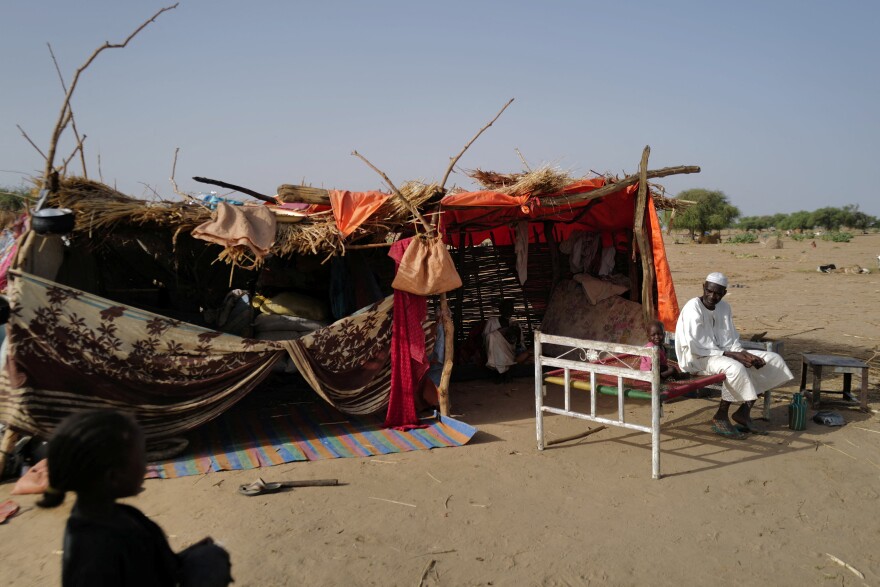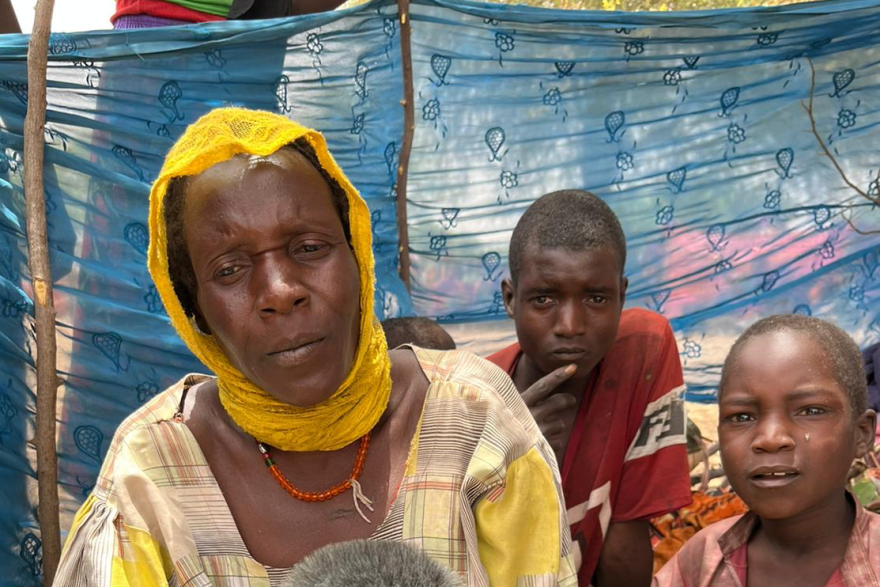JOHANNESBURG — As fighting in Sudan's capital continues to rage, experts say it is spilling over into the country's western Darfur region and risks fully reigniting a semi-dormant conflict that began two decades ago.
Brutal ethnic violence broke out in Darfur in 2003 when the government deployed the notorious Janjaweed Arab militia to put down an uprising by non-Arab groups, killing hundreds of thousands of people in what was widely labeled a genocide. That war ended in 2020, although there have since been sporadic incidents of violence.
In the current conflict in Sudan, which began in April, the de-facto government and the Rapid Support Forces (RSF) — a paramilitary group that grew out of the Janjaweed — have been vying for power, with much of the fighting centered on Sudan's capital, Khartoum. But experts warn it is now Darfur that's facing catastrophe.
Eric Reeves, an American academic who has been researching Sudan for over 20 years with a focus on Darfur, says he believes that the RSF, having suffered heavy casualties in Khartoum, could soon withdraw to Darfur "with their loot" to regroup.
RSF leader Mohamed Hamdan Dagalo, known as Hemeti, once led a Janjaweed brigade in the region.
Cities across Darfur, such as El Geneina, Kutum and El Fashar, have all seen heavy fighting in recent weeks. Satellite images of various areas show burnt villages and widespread destruction.
"We have seen in El Geneina, capital of West Darfur, and very close to the border with Chad ... just how awful the nightmare of violence can be, how destructive, how cruel. The question is whether there is anything to constrain the RSF [and] allied Arab militias, if they do in fact withdraw from Khartoum," Reeves says in an email to NPR.
"They are well armed, have hijacked a great many vehicles and have no political or ideological motive — just a lust for money and power."
Return to dark days
Reeves says the current fighting also has an ethnic component, and warns "genocide looks to be resumed on a very large scale."
Mohamed Osman, Sudan researcher for Human Rights Watch, concurs that the latest violence in Darfur is raising ghosts of the past.
"Many people from non-Arab communities did say how the brutality of these attacks, the killings, massive destruction of property and food reserves, looting, [have] been reminding them of the early dark days of the conflict in Darfur," Osman says.
"However, they also pointed to the recent and new dynamics in the violence, including the power vacuum created by the fighting in Khartoum. ... [The government's Sudanese Armed Forces] and police largely withdrew from different parts of West Darfur," he adds.
A widespread communications blackout in the region has made it almost impossible to contact sources on the ground. But early last month, Adeeb Yousif, a former governor of Central Darfur, spoke to NPR.
He said he was concerned for people in the region who were still internally displaced, two decades after the outbreak of the last conflict. There are more than 3.7 million internally displaced people (IDPs) from previous conflicts in Darfur, according to the United Nations' refugee agency.

"Some of the IDPs, they are revictimized," Yousif said, noting their camps had been burnt. "Therefore they've moved from one location to another location ... and scattered into areas such as [the] streets," he said.
Dr. Attiyah Abdullah, general secretary of the Sudan Doctors' Union, tells NPR that because telecoms are down, it's been impossible to keep up with the increasing numbers of dead in Darfur. But based on what statistics are available, fatalities are in the hundreds.
The violence is also creating a new wave of refugees, with more than 115,000 people recently fleeing Darfur to neighboring Chad.
Sudanese refugees shared harrowing accounts of brutality back home during NPR's recent visit to makeshift camps in eastern Chad near the border with Sudan.
Marriam Hadiya Mohammed, 23, has recently gone to Chad for refuge.
"The reason I came is because 'the Arabs' came to my house and said they you will empty the house for us or we will kill you all," she told NPR, referring to the RSF fighters.

Ali Tahir Mohammed, 55, has also fled to Chad.
They "were just killing people. Anyone, a woman searching for herbs, they'd kill them. Children fetching water, they'd kill them. So we just couldn't live there," he said.
Dire humanitarian situation
Doctors Without Borders, the medical aid group known by its French initials, MSF, has staff on the ground in Darfur but has not been able to access the hospital it supports in El Geneina since it was attacked and looted on April 26. Residents, including pregnant women and children, are now unable to access services, MSF says, describing the situation as "unbearable."
"Movement in the city is currently limited to proximity around one's house due to the risk of random shootings, snipers and carjackings. Access to basic necessities like water is burdened with danger, and the task of retrieving bodies from the streets has become impossible," says Moussa Ibrahim, MSF's logistics supervisor in El Geneina.
"The consequences of the escalating conflict are devastating, with attacks on humanitarian organizations, police headquarters where weapons were stolen, and civilian locations like the local market and the main university," he adds.
MSF has a surgical team waiting across the border in Chad, but Ibrahim says it is difficult for patients to get there.
"The path from El Geneina to Chad is riddled with dangers as armed groups often patrol and can stop you on your route. There is no guarantee of security," he says.
Meanwhile, former governor Yousif, Reeves and others warn the fighting is having a disastrous effect on the region's agriculture, which could lead to greater food insecurity or even famine.
Whatever happens next in the almost two-month-old conflict, Reeves says one thing's for sure: "Darfur will be in the RSF crosshairs for the foreseeable future."
NPR Africa correspondent Emmanuel Akinwotu contributed reporting from eastern Chad.
Copyright 2023 NPR. To see more, visit https://www.npr.org.

